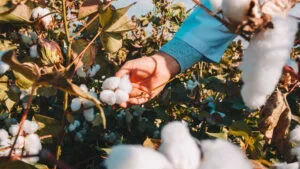Resources
Cotton Industry Glossary
🌱 Certification
Certification is an official process where an independent organization checks and confirms that the cotton meets organic and quality standards. It guarantees that the cotton was grown without harmful chemicals and follows trusted environmental and ethical practices.
🌱 Agronomy
Agronomy is the science that focuses on how crops grow and how soil can be managed better. In cotton farming, agronomy helps farmers improve their harvests by using healthy soil practices, choosing the best seeds, and ensuring sustainable farming methods.
🌱 Micronaire
🌱 Bale
🌱 Roller Ginning
🌱 GOTS (Global Organic Textile Standard)
Our Commitment
At The Cotton Farms, we are committed to conducting business in a manner that respects human rights,
protects the environment, and promotes a positive impact on the communities where we operate. Our
core values of integrity, transparency, and sustainability guide every decision we make, from the farms in Turkey to our partners globally. This policy outlines our commitment to responsible business conduct across our entire value chain. We follow the six-step due diligence process to implement GOTS Criteria,
including Environmental Criteria and Human Rights and Social Criteria

Our Approach
We believe that responsible business is not a static goal but a continuous journey of learning and
improvement. Our approach is based on the following principles:




